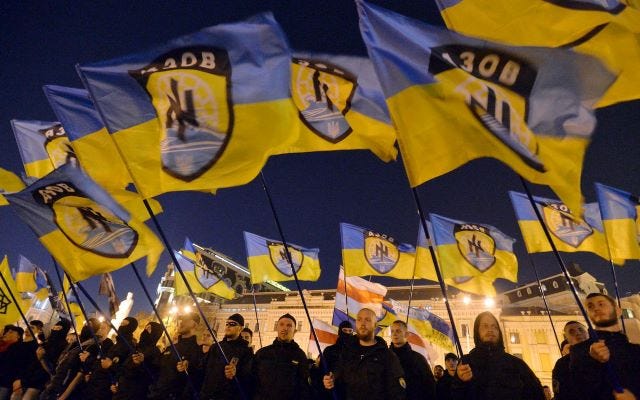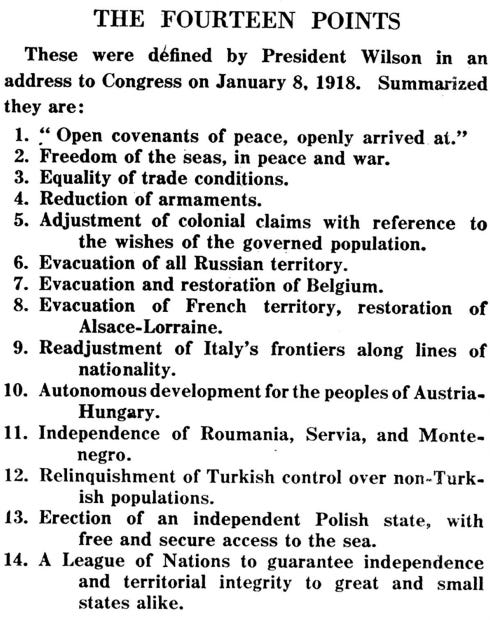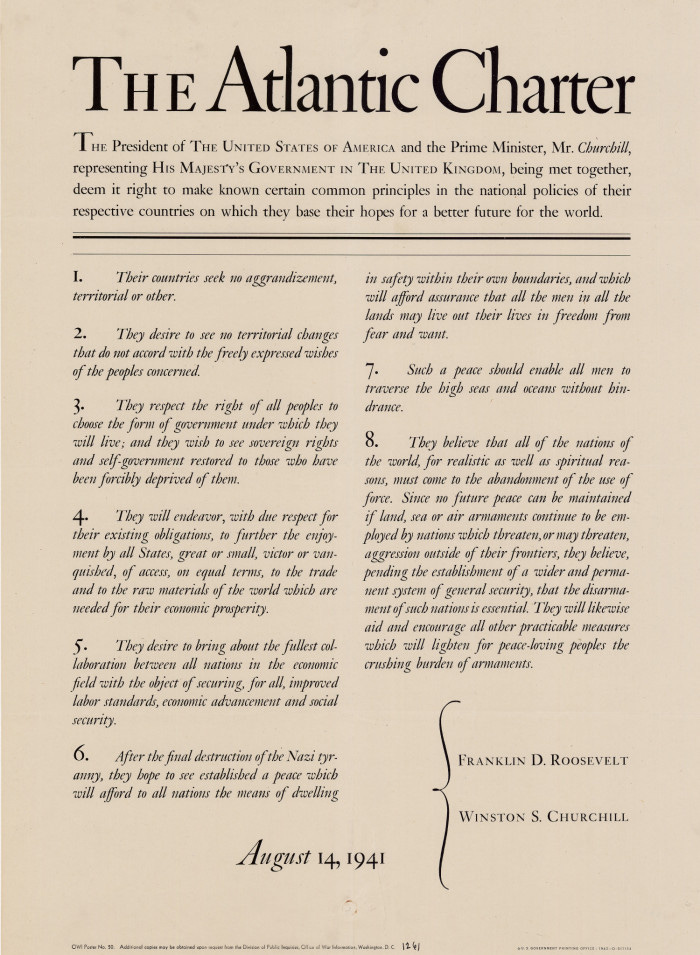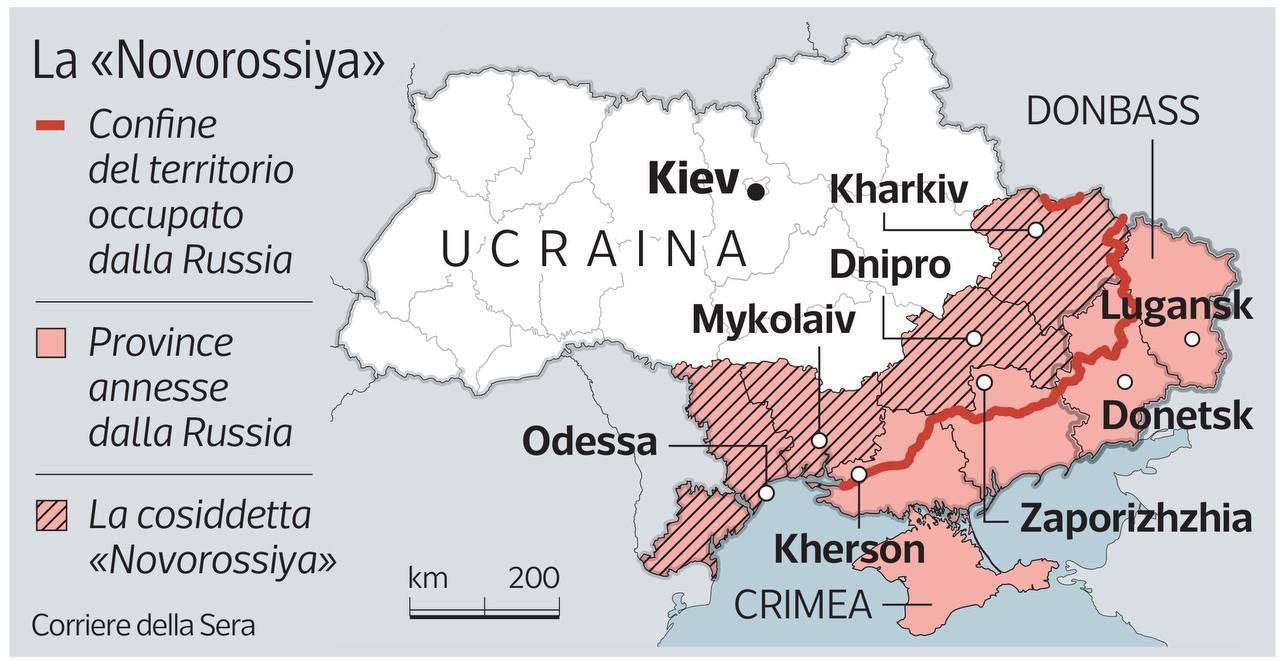Years of Dread: Part 4 – Empire Rising
Conclusion: How Ukraine’s impending defeat will mutate nationalist defiance into Azov’s transnational terror, seeking to destabilize America while simultaneously consolidating Brussels’ imperial grip.
Years of Dread: Part 1 – The Gathering Storm,
Years of Dread: Part 2 – Lost Causes
Years of Dread: Part 3 – Strategy of Tension
The European Union rises as a gilded citadel, its spires built upon the most perilous of modern myths: that nationalism—and nationalism alone—unleashed the twentieth century’s wars, and that only the erasure of European nationhood can secure perpetual peace. To Brussels’ ideologues, the nation-state is the original sin, and empire the necessary redemption. This dogma now reaches its zenith, as Russia’s shadow lengthens across the East and America’s retreating footsteps echo in the halls of NATO.
But history records a darker truth. For five thousand years, the same fatal dialectic has repeated: empire’s hunger for dominion kindles nationalism’s fire of resistance. Rome’s legions reduced Masada to ashes in 73 AD, yet Judea’s defiance smouldered in exile until 1948—when Israel’s rebirth ignited Arab nationalism’s counter-flame, still burning unquenched. The Habsburgs’ WW1 collapse birthed a dozen nations, only for Hitler to exploit their fractures. Even America’s own unilateral Pax Americana, once proclaimed as liberation, now seeds its own antibodies—from Tehran and Moscow to Beijing.
The EU imagines itself the exception to this iron law. But its architects forget: all empires believe their civilizing mission justifies their coercion, until the moment the oppressed remember they would rather rule their own ruins than serve in another’s paradise.
The Great War of Empires
When Europe plunged into war in 1914, it was not nations but rival empires that marched to the slaughter. The British Empire's globe-spanning dominion, France's colonial reach, Tsarist Russia's vast autocracy, the Ottomans' fraying theocracy, Austria-Hungary's creaking dual monarchy, and Germany's ascendant Reich—all were imperial constructs, not nation-states. For these empires, nationalism was a double-edged sword: externally a weapon to wield against rivals, yet internally a potential termite swarm working relentlessly within their structures, hollowing imperial cohesion until only a brittle façade remained.
WW1’s spark came from imperial gambits. Russia bankrolled Serbian nationalism to undermine Vienna, while Britain—through Lawrence of Arabia—nurtured Arab revolt to shatter the Ottomans, only to later partition Arab lands into new Anglo-French mandates. The Kaiser’s agents whispered to Irish rebels, seeking to bleed Britain from within. Meanwhile, both Austria-Hungary and Russia played with Ukrainian and Galician nationalism like children playing with matches—until the fire consumed them all.
Then arrived America, the empire in denial. When the U.S. entered in 1917, it cloaked itself in anti-imperial righteousness. Woodrow Wilson’s Fourteen Points explicitly framed the war as a crusade for national self-determination—a stark rebuke to the EU’s modern myth that nationalism alone caused the catastrophe. But the peace revealed the hypocrisy: Wilson’s ideals were applied only to the defeated. The victors’ empires—bloodied but unbowed—carved up the spoils, crafting a new imperial order draped in the language of liberation. The "war to end all empires" became the war that engorged the victorious imperialists.
World War II: The Empires Strike Back
The Second World War twisted the imperial-national paradox to its breaking point. Hitler’s early gambits—the Anschluss, the Sudetenland annexation—wore the mask of nationalism, a call to unite the Volk with German soil. But the invasion of Poland and Operation Barbarossa ripped that disguise away, exposing Lebensraum for what it was: not national liberation, but a colonial crusade to reduce Ukraine and Russia to hinterlands of a Greater German Reich.
This was never a war of nations. The Axis powers—Nazi Germany, Imperial Japan, Fascist Italy—were all empires in revival or revolt. Arrayed against them stood other empires: Britain’s global dominion, Stalin’s Soviet colossus, and America, the paradoxical nation-state with imperial muscles. By 1945, the conflict had shattered Europe’s old imperial order—but not before revealing the brutal calculus beneath Allied unity.
The Atlantic Charter of 1941 laid bare the tensions. Roosevelt, the anti-imperial imperialist, forced Churchill to sign a document that doomed the British Empire—using Wilsonian rhetoric of self-determination to dismantle imperial trade barriers and clear the path for American hegemony. Churchill scrawled his signature like a man signing his own death warrant, knowing these principles would bleed Britain’s empire dry.
Here was the war’s true lesson: Hitler may have ridden nationalism’s tiger, but the conflict was decided by imperial cold-bloodedness. The Soviets swallowed half of Europe; America claimed the rest under NATO’s umbrella. The post-war order wasn’t built on ideals—it was carved by victors who understood that empires, not nations, still ruled the world.
The EU's Imperial Gambit in Ukraine
The same centuries-old imperial calculus now plays out on Ukraine's killing fields—where Brussels, inheritor of Europe's colonial mantles, cultivates nationalist resistance within Moscow's contested orbit. This is realpolitik dressed in humanitarian garb: just as Britain armed Spanish guerrillas against Napoleon or Washington funnelled Stingers to Afghan mujahideen, the EU bankrolls Ukrainian self-determination as a weapon against a resurgent Russian empire. But the strategy contains its own poison. In nurturing Ukrainian nationalism, Brussels risks awakening the very forces that have historically torn multinational projects asunder—including its own. The banners may proclaim "European values," but the blueprint is pure 19th-century statecraft: divide et impera, updated for the digital age.
Here lies the EU's fatal contradiction. It condemns nationalism as the spectre that doomed Europe in 1914 and 1939, while pursuing its own imperial consolidation as the sole path to peace. Yet history shows empire and nation to be locked in an eternal dance—neither purely villain nor hero, their moral valence shifting with each era's victors. What Brussels decries as Putin's imperial revanchism, it practices as "ever closer union"; what it celebrates as Ukrainian patriotism, it suppresses as "Euroscepticism" when manifested in Warsaw or Budapest.
Now, as Ukraine's military prospects darken with each dawn, Europe's integrationists see opportunity in the wreckage. Like alchemists transmuting base metals, they seek to convert Ukrainian blood and sacrifice into the elemental fuel for their New Model EU—one where national armies dissolve into a Brussels-led legion, and sovereignty becomes a relic displayed behind glass in the Museum of European History.
The geopolitical math is inexorable. With Trump's America withdrawing its shield and the hallucination of Russia's advance appearing increasingly irreversible, EU elites face their Bismarckian moment. But there's a catch: having spent three decades pathologizing masculinity, martial virtue and outsourcing security to Washington, Europe lacks the cultural marrow for true empire-building. Their solution? Proxy violence. Expect Azov's battle-hardened remnants to become the shock troops in a manufactured "strategy of tension." Their mission: to simultaneously purge Europe's nationalist holdouts and terrorize publics into accepting the final death of nation-state sovereignty—all while Brussels' bureaucrats keep their hands clinically clean.
Europe's Fate: The Empty Barracks of Empire
Europe's existential choice crystallizes with each passing crisis: will it remain a concert of sovereign nations or complete its metamorphosis into a Brussels-led imperium? This is no theoretical debate—it's a struggle for the continent's soul, waged between two fundamentally opposed visions of power.
The Europe of Nations—championed by former French President Charles de Gaulle and now Hungary’s Viktor Orbán—offers a lifeline to traditional statecraft. In this vision, Paris, Warsaw, and Budapest remain the true loci of sovereignty, coordinating as equals rather than submitting to supranational diktat. This model aligns perfectly with the emerging multipolar world, particularly the BRICS framework of civilizational states cooperating without coercion. For a Europe seeking independence from American patronage, such flexible, horizontal integration—extending eastward into Eurasia—could prove its salvation.
Arrayed against this stands the EU's imperial project, increasingly naked in its ambitions. The dream of a European Army—once whispered in think tanks—now commands mainstream support, from philosopher Jürgen Habermas to then BlackRock director and now soon to be-Chancellor Friedrich Merz. Their 2018 manifesto exposed the fatal conceit: that pooling €326 billion (more than double Russia's budget) could magically compensate for Europe's strategic impotence. Ukraine has exposed this as fantasy—Russian factories now churn out shells at seven times Europe's rate, proving that unity without martial capacity is mere theatre.
But Brussels faces an insoluble problem: empires require willing soldiers, and Europe has systematically destroyed its own recruiting grounds. Where once farm boys and factory workers filled the ranks—men bound to soil and nation—today's Europe offers only dispossessed rural youth (with Dutch nitrogen laws set to erase 3,000 farms by 2030), deracinated populations severed from place and tradition by generations of neoliberal globalization, and the last-ditch hope that migrant populations might fight for a bureaucratic vision. History shows men die for homelands, not supranational committees.
Now, as Brussels demands €800 billion for rearmament, it confronts its own contradictions. This militarization push—ostensibly to counter Russia—requires social cohesion that EU policies have deliberately undermined. You cannot forge swords after you've offshored the ploughshares. The neoliberal project, having spent decades dissolving the bonds of nationhood, now expects phantom citizens to rally to its imperial banner.
Dread's Forge
French President Macron's recent warning that a Russian victory would reduce Europe's credibility to zero reveals more about EU fantasies than realities. The bloc's imperial architects - heirs to the vengeful spirit of France's Third Republic - are already preparing to hammer Ukraine's defeat into a weapon of perpetual revanchism. This is no ordinary policy shift, but the dark alchemy of empire-building: transforming military failure into ideological fuel, forging European unity from the white-hot dread of a Russian spectre. The EU cannot sustain itself on cooperation alone - it needs an eternal enemy, and Moscow has been cast in that role.
Against this stands Europe's rising alternative: rooted internationalists seeking a brotherhood of patriots, who envision nations as vibrant threads in a Eurasian tapestry. As I argued in Ordered off the World-Island (2023), America's retreat creates unprecedented opportunities - not for division, but for connection. Poland's eagle and Hungary's tricolor might yet clasp hands with BRICS partners in a horizontal network of sovereign states, smashing down Mackinder's walls against the Russian heartland by building bridges. This is the true post-American vision for Europe: not Brussels' sterile monochrome, but a kaleidoscope of authentic national identities dancing across continents.
Yet to EU imperialists, such openness represents existential terror. They perceive only a triple menace: Trump's capricious America, China's ascendant might, and Russia's creeping shadow - with the BRICS chorus amplifying this dissonant symphony. In response, Brussels transforms fortress-Europe into prison-Europe, its commissars and EU-funded NGO’s hunting down internal "wreckers" who dare envision alternatives.
The Stalinist parallel is chilling - where Pravda once denounced saboteurs in 1937, EU media now tar sovereigntists as Kremlin fifth columnists. The pattern culminates in Romania's electoral farce: first the cancellation of elections, then the police interrogation of the victorious nationalist candidate - a perfect contemporary tableau of Soviet-style political liquidation, proving that when democracy threatens empire, democracy must yield.
EU imperialism is nationalism's darkest inversion - not pride in one's people, but pathological fear of others. Not the vibrant diversity of flags, but the deadening uniformity of dread. The EU project, conceived as peacemaker, now threatens to become Europe's jailer.
Years of Dread: Ukraine's Aftermath and the Coming Storm
The current trajectory suggests a Badman Theory exit for Ukraine—a slow-motion collapse mirroring America’s retreat from Vietnam, punctuated by escalations like the Yemen strikes, which echo Nixon’s Cambodian gambit. Meanwhile, the unusual deployment of B-2 bombers to Diego Garcia hints at Trump’s potential pivot: trading Ukrainian concessions for Russian tolerance of an Iran air campaign—or perhaps countering accusations of Ukrainian "surrender" with a new strongman Middle Eastern war? Yet even political alchemy has its limits; there will be no resurrection of Ukraine’s fortunes without sending Trump’s MAGA base to die in the Donbas—a spell too dark for even a wizard as wickedly talented as Trump to cast.
The question now is not whether Russia will annex five oblasts (Crimea, Donetsk, Luhansk, Kherson, Zaporizhzhia), but whether it can extend the war long enough to claim four more (Odessa, Mykolaiv, Dnipro, Kharkiv). What is certain is that Ukraine’s defeat will birth a stab-in-the-back insurgency, its nationalist remnants lashing out at the West that failed them. Already, Ukrainian propaganda videos simmer with menace.

In the U.S., Azov-linked attacks will be personal, theatrical, and drenched in revenge—a Red Brigades from Italy’s Years of Lead redux. These operations may find unlikely allies in anti-Trump factions, who could tacitly endorse or even abet the violence. Imagine the reaction if an Azov drone strike maimed Trump, and Blue cities erupted in celebration. A freshly-inaugurated President J.D. Vance would have his Reichstag Fire moment—a state of emergency justified not just by the attack itself, but by the grotesque spectacle of half of America cheering it.
On the continent, the campaign will be colder, more strategic—a revanchist forge to hammer the EU into a fourth superpower. Azov’s European operations will mirror the neofascist New Order from Italy’s Years of Lead: random massacres in train stations, assassinations of right-populist leaders, all carefully blamed on either Russia or "fascist" nationalists until the two become indistinguishable in the public mind. The goal? To discredit the Europe of Nations while justifying the birth of an EU Garrison State.
Zelensky—should he survive—could become this new empire’s tragic mascot, his arc inverting Mao’s: from failed warrior against Russia to EU empire-building symbol. "Free Ukraine" will serve as both rallying cry and pretext, with Brussels and Azov sharing an unspoken pact: terror as the midwife of centralization.
Azov’s terrorist strategy will be schizophrenic—centrifugal in America, where violence shatters cohesion and weakens Trump, and centripetal in Europe, where terror herds nations into Brussels’ fold. All roads lead to one objective: a militarized EU, its legitimacy built on the dream of avenging Ukraine. The old world died in 2022; the new one will be struggle to be born in dread.








Given the curious Ukrainian Judeo-Banderist movement, the strange support for the Kiev regime by anarchist elements (Makhno-Banderists?) & RHIC-EDOMesque wanna-be-assassins like Ryan Routh, makes the concept of a future ultra-left/progressive anti-Trump alignment with Azov Ukrainian ultra-nationalist/neo-nazi veterans, entirely plausible.
Likewise an old fashioned GLADIO 2.0 strategy of tension to unite the huddled Euro-masses against the enemy image of Mother Russia seems equally possible.
Excellent article. Food for thought and grounds for further research as elder anti-fascist US radio host Dave Emory would say.
Looked at through the historical lens of Western European history this is a pretty reasonable article . However from a broader perspective things look rather different I think.
Western Europe is in terminal decline culturally, socially and economically. Its leaders are walking mental and moral zombies. It lectures the rest of the world on “values” but the words completely lack credibility and moral substance. They (the EU , Krauts, Poms and Frogs) resemble nothing so much as third rate kabuki actors in a largely empty provincial theatre.
Europe has no real power in world, unlike China, India, Russia and the US. As recent events show all too clearly it is now irrelevant on the world stage. Its fate will be decided capriciously by these powers, as they once did with their various colonies. What goes around comes around.